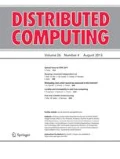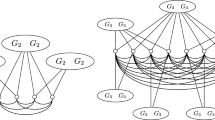Abstract
It is conjectured that the only way a failure detector (FD) can help solving n-process tasks is by providing k-set consensus for some \({k\in\{1,\ldots,n\}}\) among all the processes. It was recently shown by Zieliński that any FD that allows for solving a given n-process task that is unsolvable read-write wait-free, also solves (n − 1)-set consensus. In this paper, we provide a generalization of Zieliński’s result. We show that any FD that solves a colorless task that cannot be solved read-write k-resiliently, also solves k-set consensus. More generally, we show that every colorless task \({\mathcal{T}}\) can be characterized by its set consensus number: the largest \({k\in\{1,\ldots,n\}}\) such that \({\mathcal{T}}\) is solvable (k − 1)-resiliently. A task \({\mathcal{T}}\) with set consensus number k is, in the failure detector sense, equivalent to k-set consensus, i.e., a FD solves \({\mathcal{T}}\) if and only if it solves k-set consensus. As a corollary, we determine the weakest FD for solving k-set consensus in every environment, i.e., for all assumptions on when and where failures might occur.
Similar content being viewed by others
References
Chaudhuri S.: More choices allow more faults: Set consensus problems in totally asynchronous systems. Inf. Comput. 105(1), 132–158 (1993)
Herlihy M., Shavit N.: The topological structure of asynchronous computability. J. ACM 46(2), 858–923 (1999)
Saks M.E., Zaharoglou F.: Wait-free k-set agreement is impossible: the topology of public knowledge. SIAM J. Comput. 29(5), 1449–1483 (2000)
Borowsky, E., Gafni, E.: Generalized FLP impossibility result for t-resilient asynchronous computations. In: STOC, pp. 91–100. ACM Press (1993)
Borowsky E., Gafni E., Lynch N.A., Rajsbaum S.: The BG distributed simulation algorithm. Distrib. Comput. 14(3), 127–146 (2001)
Chandra T.D., Toueg S.: Unreliable failure detectors for reliable distributed systems. J. ACM 43(2), 225–267 (1996)
Chandra T.D., Hadzilacos V., Toueg S.: The weakest failure detector for solving consensus. J. ACM 43(4), 685–722 (1996)
Jayanti, P., Toueg, S.: Every problem has a weakest failure detector. In: PODC, pp. 75–84 (2008)
Raynal, M.: K-anti-Omega (2007) Rump session at PODC (2007)
Zieliński P.: Anti-omega: the weakest failure detector for set agreement. Distrib. Comput. 22(5–6), 335–348 (2010)
Lamport L.: Time, clocks, and the ordering of events in a distributed system. Commun. ACM 21(7), 558–565 (1978)
Herlihy M.: Wait-free synchronization. ACM Trans. Program. Lang. Syst. 13(1), 123–149 (1991)
Zieliński, P.: Automatic classification of eventual failure detectors. In: DISC (2007)
Chu F.: Reducing Ω to \({\diamondsuit W}\). Inf. Process. Lett. 67(6), 293–298 (1998)
Lo, W.K., Hadzilacos, V.: Using failure detectors to solve consensus in asynchronous shared memory systems. In: WDAG, LNCS 857, pp. 280–295 (1994)
Gafni, E., Guerraoui, R.: Simulating few by many: limited concurrency=set consensus. Unpublished manuscript, available at http://www.cs.ucla.edu/~eli/eli/kconc.pdf (2009)
Guerraoui R., Kuznetsov P.: Failure detectors as type boosters. Distrib. Comput. 20(5), 343–358 (2008)
Chaudhuri, S.: Agreement is harder than consensus: Set consensus problems in totally asynchronous systems. In: PODC, pp. 311–324 (1990)
Herlihy, M., Shavit, N.: The asynchronous computability theorem for t-resilient tasks. In: STOC, pp. 111–120 (1993)
Saks, M., Zaharoglou, F.: Wait-free k-set agreement is impossible: The topology of public knowledge. In: STOC, pp. 101–110. ACM Press (1993)
Gafni, E., Kuznetsov, P.: The weakest failure detector for solving k-set agreement. In: PODC (2009). Full version: http://www.net.t-labs.tu-berlin.de/~petr/pubs/wfd-kset.pdf
Delporte-Gallet, C., Fauconnier, H., Guerraoui, R., Tielmann, A.: The disagreement power of an adversary (brief announcement). In: PODC (2009)
Anta, A.F., Rajsbaum, S., Travers, C.: Weakest failure detectors via an egg-laying simulation (brief announcement). In: PODC (2009)
Delporte-Gallet, C., Fauconnier, H., Guerraoui, R., Tielmann, A.: The disagreement power of an adversary. Distrib. Comput. (2011)
Gafni, E., Kuznetsov, P.: On set consensus numbers. In: DISC (2009) pp. 35–47
Delporte-Gallet, C., Fauconnier, H., Guerraoui, R.: Tight failure detection bounds on atomic object implementations. J. ACM 57(4), 22:1–22:32 (2010)
Zieliński, P.: Sub-consensus hierarchy is false (for symmetric, participation-aware tasks). https://sites.google.com/site/piotrzielinski/home/symmetric.pdf?attredirects=0 (2009)
Author information
Authors and Affiliations
Corresponding author
Additional information
This paper combines results appeared in the Proceedings of the 28th ACM Symposium on Principles of Distributed Computing (PODC 2009) and the 23rd International Symposium on Distributed Computing (DISC 2009).
Rights and permissions
About this article
Cite this article
Gafni, E., Kuznetsov, P. On set consensus numbers. Distrib. Comput. 24, 149–163 (2011). https://doi.org/10.1007/s00446-011-0142-8
Received:
Accepted:
Published:
Issue Date:
DOI: https://doi.org/10.1007/s00446-011-0142-8




